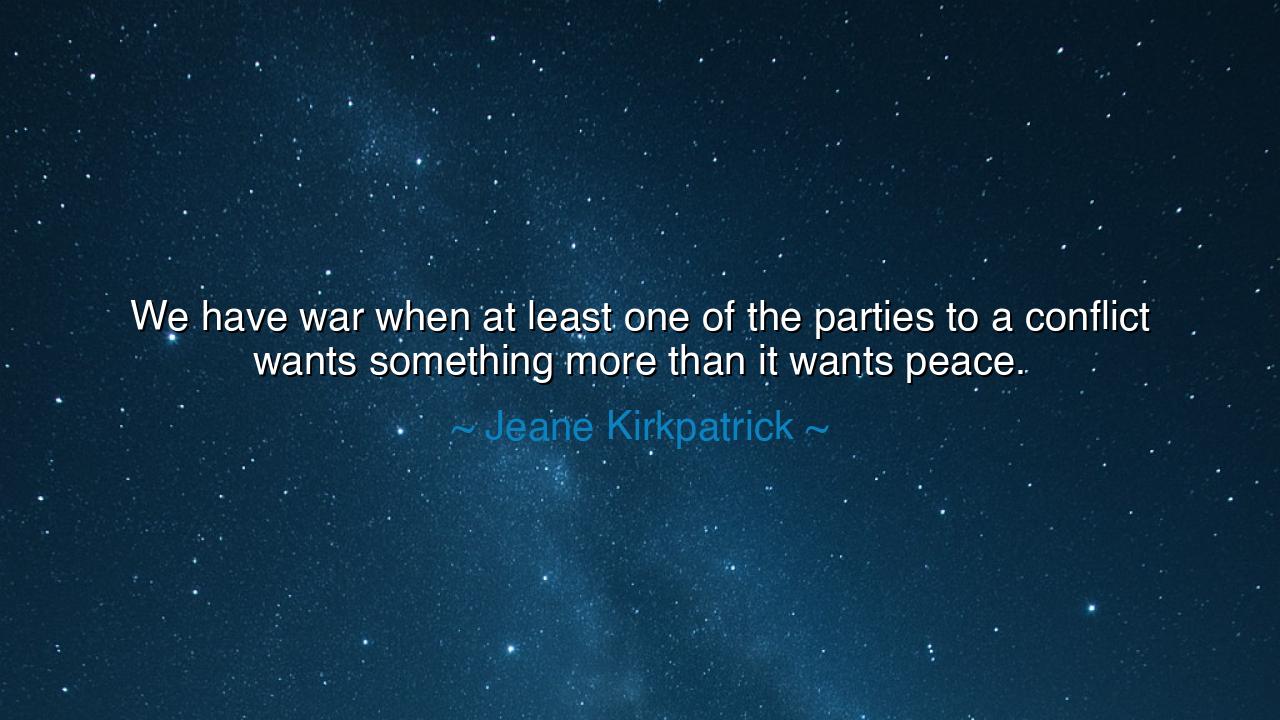
We have war when at least one of the parties to a conflict wants
We have war when at least one of the parties to a conflict wants something more than it wants peace.






Jeane Kirkpatrick, the sharp and unyielding voice of diplomacy, once declared: “We have war when at least one of the parties to a conflict wants something more than it wants peace.” In these words lies the essence of all human strife, reduced to its simplest truth. War is not born of accident, nor of chance; it is born when desire outweighs harmony, when ambition burns brighter than the longing for peace. Where both sides value peace above all, reconciliation will be sought; but where one values land, power, revenge, or pride more than peace, then war becomes inevitable.
The ancients knew this grim law. Thucydides, chronicler of the Peloponnesian War, wrote that men go to war for fear, honor, and interest. Each of these is a desire stronger than peace: fear of being conquered, hunger for honor, lust for wealth or land. The Greeks, though wise, could not escape this cycle, for Sparta prized dominance above peace, and Athens cherished glory above calm. Thus, war consumed them both. Kirkpatrick’s words are the modern echo of this ancient pattern: it is always the triumph of desire over peace that lights the torch of war.
History offers us vivid proof. In 1914, Europe stood balanced upon a knife’s edge. Peace was possible, for no great power truly wished to see its lands burned. Yet Austria-Hungary desired retribution more than peace, Germany desired expansion more than peace, and others desired honor, alliance, and revenge. One by one, nations chose something else above the preservation of peace, and so the Great War began, drowning a generation in blood. Here, Kirkpatrick’s wisdom shines painfully clear: war erupts not from necessity alone, but from misplaced desire.
By contrast, there are moments when peace was saved because the desire for it outweighed all else. Consider the Cuban Missile Crisis of 1962. The world stood upon the brink of nuclear annihilation. Both the United States and the Soviet Union had weapons ready, and both had much to gain in power and influence. Yet in the final hour, Kennedy and Khrushchev desired peace more than pride, more than dominance. Because they valued peace above their ambitions, war was averted, and humanity was spared a terrible fate.
Children of tomorrow, take this teaching deep into your hearts: war begins not with weapons, but with misplaced values. The battlefield is prepared long before the first shot, in the secret chambers of the heart where men decide what they treasure most. If vengeance, pride, or power are placed higher than peace, then conflict is already born. But if peace is cherished as the highest prize, then even the most dangerous quarrels may yet be calmed.
The lesson is clear: examine your desires, both as individuals and as nations. Ask always: What do I want more — victory or peace? Honor or harmony? Power or life? When peace is placed first, conflicts shrink into dialogue, disputes dissolve into compromise. But when anything else is prized above it, war comes with certainty, and it devours not only the guilty, but the innocent as well.
Practical action flows from this wisdom. In your daily life, when conflict arises — in family, in friendship, in community — weigh what you seek. Do you hunger more for being right, for winning the argument, for proving your strength? Or do you hunger more for peace? Choose peace, and you will build bonds that endure. On the scale of nations, demand leaders who place peace above ambition, who seek cooperation over conquest, who see that true greatness lies not in domination, but in preserving life.
So let it be remembered: “We have war when at least one of the parties to a conflict wants something more than it wants peace.” These are not only words of policy, but words of prophecy, spoken for all generations. If you would avoid war, in your heart and in your world, then prize peace above all other treasures. For where peace is supreme, war has no place, and humanity may yet endure in unity and hope.






AAdministratorAdministrator
Welcome, honored guests. Please leave a comment, we will respond soon